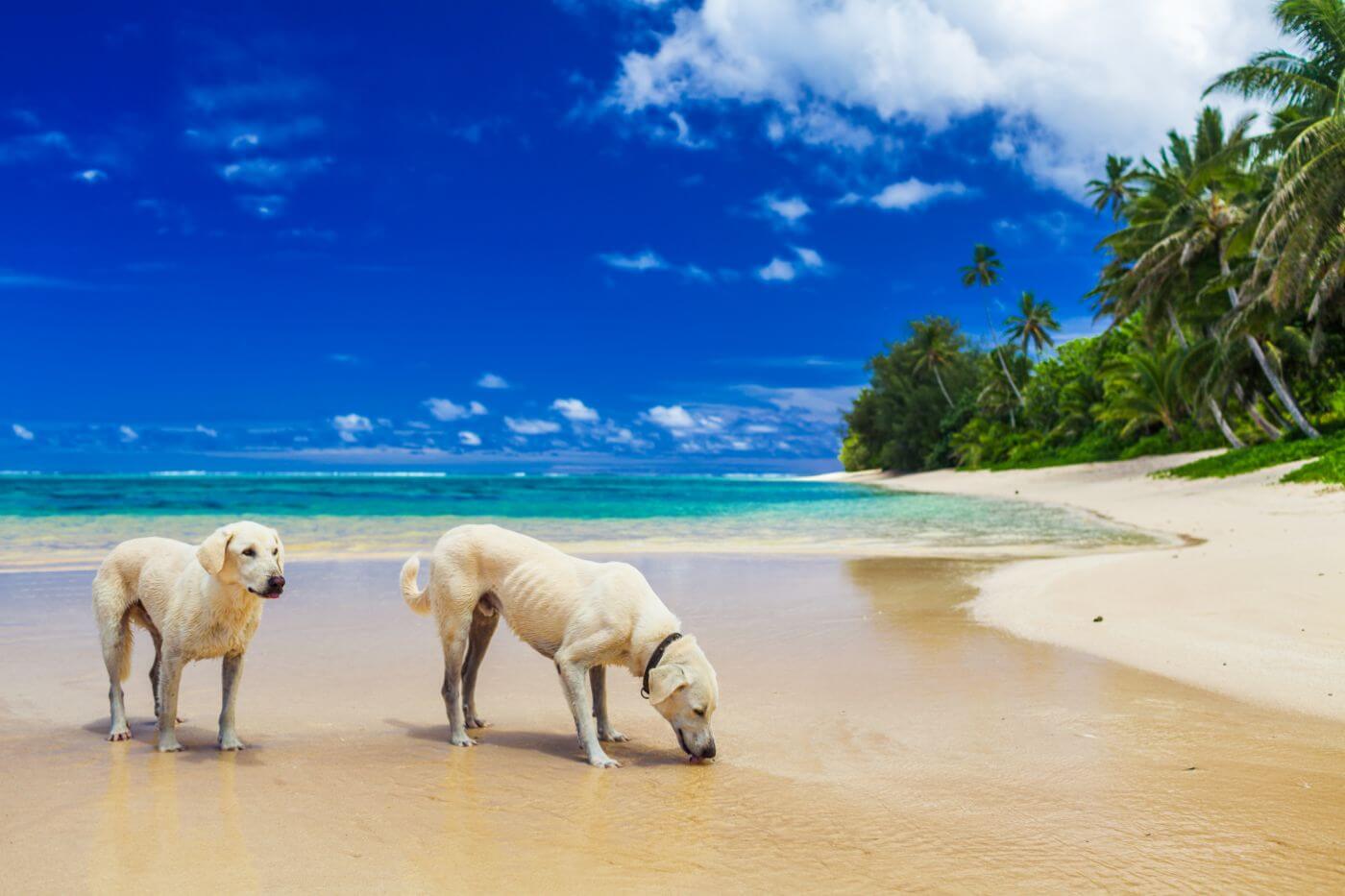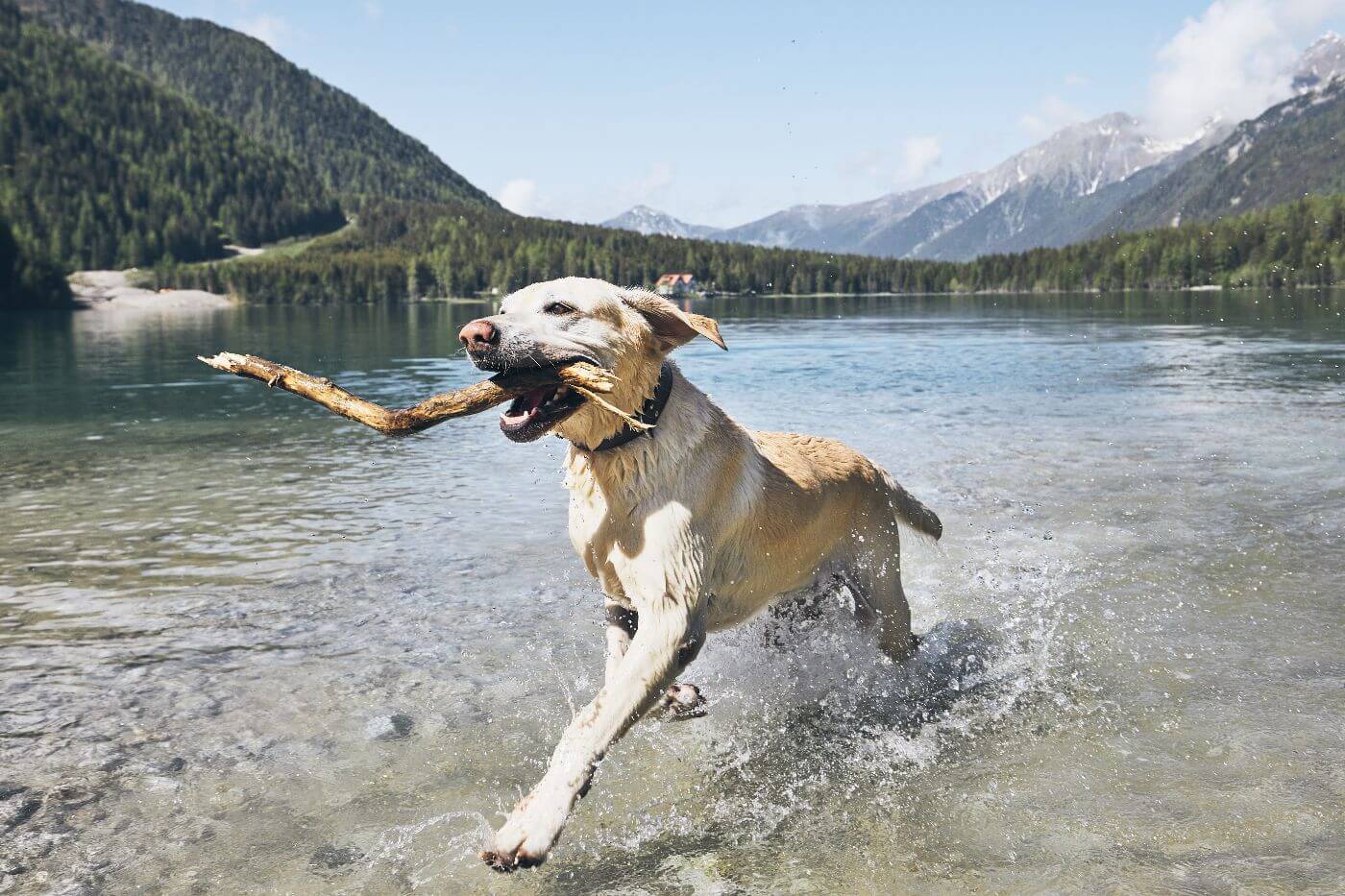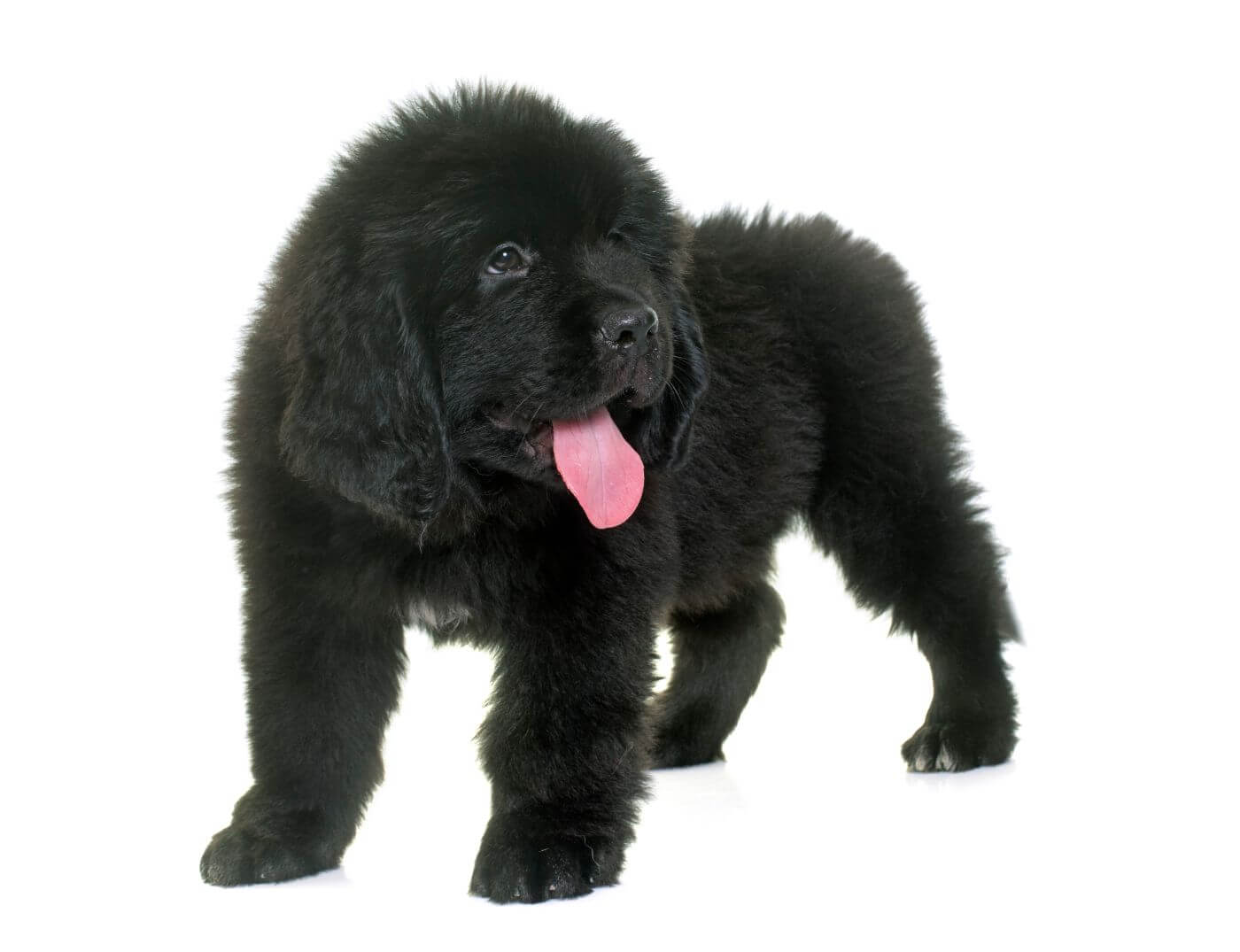What Makes a Good Dog for Sailing?
A lot of sailors prefer to opt for smaller dogs as they take up less space on board, they need fewer cans of food and it’s easier to clean up after them if they have an accident. On the other hand, larger water-loving dogs can handle anything you throw at them – literally! – whether that’s swimming alongside you in a kayak, lounging around on the deck or jumping to the rescue of a lost boat shoe.
Other characteristics you’ll want to look out for include:
These characteristics vary between breeds, as well as between dogs, so take the time to consider the best breed for your needs.

Coat type may also influence your decision for which breed to get. Some dog breeds like Labrador Retrievers and Chesapeake Bay Retrievers have double-layered coats that make them well-suited to water. Their coats have natural oils that help excess water to run off, keeping their body temperature more stable.
However, there is one downside to this coat style and that’s the dreaded ‘wet dog smell’! Their longer hair can be slower to dry than other breeds and it can be really stinky in the process. Of course, you might be one of the people who loves the smell of wet dog (my mum included!) but it’s definitely something to bear in mind if you’re going to be in close quarters with your canine companion.

I grew up with Labradors and in my opinion, they are the most loving, kind-tempered and chilled out dogs you can possibly find. Labradors are easy to train and eager to please, which makes them ideal for taking out on the water with you. They are ready to muck in with whatever the rest of the family is doing, and they’ll happily plonk themselves on deck whilst you are mucking around, not a care in the world. This relaxed state of mind makes them really easy dogs to have, you don’t have to worry about them running off and they don’t really get bored. They also love swimming!

Historically used as water dogs, Newfoundlands are also a great choice for sailors and boaters, as long as you have the space. These enormous dogs were built to swim and they were originally used as working dogs, from bringing in tow lines to pulling nets to life-saving. Their sweet temperament makes them ideal for having around when you’re sailing but they are known to slobber so pack your waterproofs!

Also a water-based working dog, the Spanish Water Dog was originally bred to retrieve waterfowl. Their characteristic curly hair gives them buoyancy in the water whilst also allowing them to cool their bodies more efficiently. This is an adaptation suited to their historic use as sheep herders. Their herding nature means they’re full of energy and hyper-intelligent so they’re fun to have around, just make sure to give them lots of exercise before taking them out sailing.

The name Poodle is rumored to come from the German ‘pudeln’ meaning puddle or to splash in mud and ‘pudelnass’ meaning wet. They certainly live up to their name as the majority of Poodles love water! Traditionally used as water retrievers, they are extremely active dogs. Thankfully, swimming is an ideal perfect form of exercise to wear them out!
Poodles are intelligent which makes it easier to adapt them to life on the water, as well as life at home. They are generally calm and friendly dogs and conveniently come in different sizes – Standard, Miniature and Toy. Miniature is a good choice if you’re tight on space and prefer a more compact breed.
Labrador RetrieverThe Labrador Retriever is the number one dog choice on almost every list including being the number one dog breed in America. They were originally called St. John’s Water Dogs because they helped the local fishermen and they still love to help. These pawtastic fur babies enjoy doing anything as long as they can do it with you.
Another breed with a waterproof coat and webbed feet, the American Water Spaniel is a pawesome choice for you if you like to spend time on a boat. They’re known for their ability to jump in and out of a small boat without even rocking it, and they will even help you catch some fish.
For those of us who grew up watching the heroics of Lassie and the glorious pathos of the Littlest Hobo on our TVs, the humble dog is a beast worthy of great acclaim. The companionship, the comedy, the loyalty, the protection, the selfless service – it all comes together to create an animal that is not just great to have in the home, but ideal to have as a crew member on board your boat. However, finding the right dog can be a very tricky business. The ideal animal needs to be quick to learn, eager to please, good with the family and of quite a settled and attentive nature. It also needs to be fond of the water, good at swimming and blessed with a coat that will put up with a regular dousing without getting smelly or waterlogged. Dogs that are especially large, energetic or unpredictable should be avoided in favour of small to medium sized dogs with a gentle (but not timid) temperament, plenty of intelligence and some proven water work on their CV. It might sound like a pretty tough brief but there are actually plenty of tailor-made options just waiting to be explored.
ARE LABRADOR GOOD GUARD DOGS?
Anyone who has owned a pet, know they provide more than just companionship. Animals sense things that humans can’t, and that includes the mood and health of the captain and crew. Perhaps that’s why cats and dogs and of course, parrots, have long been a part of seagoing life. After our beloved cat Jake recently died at the ripe old age of 21 years, I had time to reflect upon the vital role he played in our lives, especially during the pandemic. He had the wonderful sense of humor, and seemed to know just when someone in the family needed a snuggle. Few things are as soothing as a resonant purr.
Seagoing pets are not limited to dogs, cats, and birds. Over the years, I’ve encountered everything from rabbits (despite the sailors’ superstition regarding rabbits) to lizards to a rescued cuscus aboard, but, like the cuscus — whose diet restrictions and tendency to climb the mast during midnight watches proved problematic — dogs present unique challenges to the cruising sailor. Most breeds require room to roam and, unlike cats, who have a low center of gravity and can spring up the steepest companionway ladder, many favorite dog breeds have trouble climbing, and keeping their footing (paw-ing?) on a boat underway. On the plus side, dogs are typically more comfortable in the water than cats, snakes, birds — and, I presume, the tree-dwelling cuscus. (I’d add rabbit to the list of hydrophobic animals, but I’m afraid former U.S. President Jimmy Carter, who had an infamous brush with fast-paddling rabbit, would likely object.)
Despite their anatomical handicaps, some dog breeds are pretty well adapted to boats and the water. The dog lovers among our readers have helped us put together this list of relatively small dogs, good traveling dogs that like the water and are happy to curl up in tight spaces during passages. Here is a list of the most popular breeds that were recommended. Many of these are very active dogs, so they would be best suited for bigger boats and owners that took them ashore for long romps during the day.
Schipperke. We encountered one of these Belgian barge dogs while cruising, and it seemed very happy aboard-albeit a little noisy. This was a 60-plus-foot Danish seiner that offered plenty of room for the agile, high-energy dog to roam. Its owner, a former merchant seaman, proudly told us that his dog was a champion rat-catcher.
Bichon Frise. These fluffy little companion dogs are descendants from the water spaniel and the standard poodle. They are good travelers, and they don’t shed. In the 17th and early 18th centuries, they were often carried on tall ships and used as barter items. We once cared for a bichon-poodle mix while its owner was away. The dog seemed quite content aboard the Tayana 37 that was his home, but it wasn’t much of a guard dog.
American water spaniel. These water-loving dogs are much bigger and more active than the bichon, although they are reportedly quite adaptable to apartment life, which I would equate with living aboard.
English springer spaniel. Murphy, our test dog for our doggie life jacket test was a model citizen throughout our two-day test, leading me to believe he’d be quite comfortable on a long-term cruise.
Portuguese waterdog. Before the Obama’s Bo, there was Ted Kennedy’s Splash. These dogs, originally bred to help Mediterranean net fishermen, seem well-suited for the water.
Retrievers. Labrador retriever, golden retriever, Chesapeake Bay retriever . . . any retriever seems like a great choice for a boat, so long as they get enough exercise. I was sad to learn that writer Farley Mowat‘s beloved retriever, a St. Johns water dog, became extinct in the 1980s. Teddy Roosevelt’s Chesapeake Bay retriever-aptly named Sailor Boy-relished time in the water. Retrievers seem to require a lot of play/work, so I’m not sure whether they would be happy during longer passages, but at least you’d never lose a hat overboard again.
This is a very short list. Other dogs we’ve looked at include Staffordshire terriers, Catahoula, poodles, beagles, Irish setters, cocker spaniels, and even Newfoundlands, but I worry that some of the bigger, more active breeds may need more exercise than the boat life could provide. Owning a dog is responsibility enough when living ashore; only a sailor who truly understands the commitment required should consider bringing one aboard.
I’m interested in hearing about other people’s experience with boat pets, tips on care, and what breeds they suggest. Please share your comments below. We’d love to see more pet pictures for our Facebook page. You can also email or send digital photos to me at [email protected]